I Read "The Hades Calculus" by Benjanun Sriduangkaew, writing as Maria Ying
I have gained a madness rune etched into my brain and it was entirely because I tried to make sense of her imagination.
NOTE: This review was written under the assumption that Ying was Sriduangkaew’s pseudonym, but it’s apparently a shared name with Devi Lacroix. I did not know that when I read this.
The ancient Greeks are one of those things I’m aware are a cornerstone of storytelling writ large, but I only ever peek out at it through popular fiction. I had a great time ripping off the pantheon’s heads off one by one in the God of War games, that claymation medusa from Clash of the Titans was fucking awesome, and I recall falling asleep during that Netflix anime. And now I find myself here, holding The Hades Calculus, wondering where my life went so wrong.
I'll be blunt; this book is fucking atrocious, but in a way that’s a departure from my usual grind of unremarkable self published Amazon genre fiction. Crimson Queen was bad, but it only ever wanted to be a Dungeons and Dragons campaign with a mix of young adult fantasy and Game of Thrones. Hades Calculus has the special sauce that makes a bad, derivative book really, really suck – it is pretentious as fuck.
Big Picture, Please
The Hades Calculus portends to be a genre mashup – a retelling of the Greek pantheon as gods ruling over a scifi future, involving mech pilots, clones, hacking, and kaiju. It’s a juggernaut of an ambition to balance romance, world building, and a dense cast all in one book, and good lord does Hades Calculus fuck all that up every way it can. And it’s, so, so proud of itself all the while.
The basic premise is as follows, and I’m cutting quite a lot out; In the world of Hades Calculus, all of humanity lives in Elysium, one mega environment ruled over by the twelve gods of Olympus. Demeter holds a secret lab where she grows clones with cybernetic and biological augmentations. The fourth prototype clone which ends up calling itself Persephone escapes from her mother’s clutches and lands with Hades, Lord of the Machine Dead. They have romantic tensions and a lot of sex, usually with Hephestus, and Hades declares Persephone the pilot of her mech known as “Styx”, and she’s utilized to fight the colossi who beat on the walls of Elysium, all the while butting heads with Demeter’s malicious scheming and betrayals in the background.
If the words “the colossi who beat on the walls of civilization” is perking your ears up, then congratulations on your basic pattern recognition for genre fiction. And that brings me to my first gripe about this book; if I had a boxcutter, I could freehand trace all the material borrowed from other, better pieces of fiction from it.
A city surrounded by titanic beasts, kept safe by fortified walls, each with their own special names? That's just Attack on Titan, itself already a gundam story. But in case you feel like I'm being unfair, let's talk about the heroine for a moment. After a bit of googling, I have learned the entire science experiment Persephone plotline cribs from Gundam: Witch from Mercury. A psychic gundam pilot, the fourth in their line, as part of a sinister conspiracy of continuing war? I didn’t watch the show, but I don’t even think that’s imitation-as-flattery, that’s just duplication.
And hey, why not get familiar with our core love interest, Hades, a broad-shouldered, grouchy God of the Dead who is physically imposing, stern, reclusive, and severe? Surely it could not be the titular Hades from the award-winning roguelike of the same name, for you see this one is a god of the machine dead! It's actually quite different, and if that didn't sway you, consider the following; THC's Hades is also a woman! So you see, it's actually nothing like the Supergiant title.
There’s no real harm in taking inspiration from other media, even to the point of borrowing the entire premise. The creator of Beast Wars once had it pointed out that he stole the entire pilot of Transformers, and in response he said he had no idea, but he wished he knew, because “If I creatively steal, I prefer to do it on purpose.” Creative borrowing is great, especially when you want to trick the reader’s brain into comfort before changing where it’s going.
But around the time THC introduces the concept of ‘synchronizing with your eidolon’, complete with characters bragging about exact percentages and emotional shock disrupting your connection to your mech, I start to wonder what the flying fuck is going on with this book. Are we actually an independent story, or just a loose assemblage of popular fiction and cliches thrown together in a box and sold as a gripping piece of speculative fiction? Spoiler warning: yeah, it’s the second one.
Hang on, I think I’ve overcomplicated things, so let’s all take a big step back for a second. The real core of this story, slapping aside all the bells and whistles and glitzy neon, is the relationship between transfem broody Hades and the slender, genetically augmented Persephone. The writer tries to pretend it’s about so much more than that, like motherhood and narcissistic parents and trust and tragedy, but no, it’s a frictionless, boring dark romance book that’s had so much extraneous bullshit stapled on you can barely lift the fucking thing.
I say the core of the story is their relationship, but I caution using the word ‘romance’, because there isn’t one. I joke about Hades being one Dark Souls 2 coffin away from just being stolen from the Supergiant video game, but I wish the writer borrowed more from him. She’s aesthetically similar, but comes off like a third-rate piece of fanfiction, with no sense of Greg Kasavin’s writer’s voice, yet no deviation from his variant strong enough to make her unique.
Hades is moody and brooding, but immediately takes to Persephone, trusts her in her compound, announces her utter lack of sexual intentions, and lowers herself to Persephone’s station by bathing her feet and hands, personally.
This is, I emphasize, the first scene where they meet. The main characters, and the core romance, and they’re already demonstrating zero friction or mistrust, doing something as intimate and tender as grooming.
Oh, Gods
Persephone is equally bland. She could be potentially interesting, a suffocated young woman bred altered and conditioned by a narcissistic mother to be a living weapon, throwing it all away at the chance of freedom depending on a god’s grace. But immediately all of the feral, guarded, paranoid urges vanish and she bonds to Hades, as well as Hades's friend and fuck buddy, Hephestus. You might think the infamously jealous and petty Greek gods would be upset about having to share a woman as enticing and dangerous and sleek as her, but no, not really. They're fine with it.
“They’re not jealous or controlling or possessive?” you might be thinking. “But if Hades isn’t a dick, and Persephone is not insecure, paranoid, then what character growth are we meant to see exactly?” And friend, if you came here for character growth, you are going to be gravely disappointed. Take, for example, this next snippet.
Hephestus takes her around to look at the hangar and the mobile suits, a nice little establishing scene to show off that this is a mech story. In the process, Hephestus goads her into revealing something about herself, and – with psychic powers she’s had the whole book – she breaks into databases remotely, absorbs all of the confidential information, synthesizes enough to make a theory, and criticizes the gods for their inaction, complacency, and inertia when it comes to the colossi threat.
This is how Haephestus responds to such a grave insult and violation of privacy:
Footnote: I’m going to try my best but there are a lot of unique pronouns in this book and writing this now I struggle to recall if Heracles is “xe” or “eir”
There’s a castoff line about how this is a delicate political situation, but Hephestus is totally unbothered and welcomes her criticism openly.
Another example; Hades declares Persephone her pilot, despite her being a clone and literal property of Demeter, causing the gods to erupt into argument. Zeus demands to speak with her sister, and the others clear out. A fistfight ensues, with a lot of exposition of the pilots that came before and how Zeus has moved on from her grief, while Hades hasn’t. Then we get this:
You know, I was under the assumption that Greek gods are petty, self involved, and prone to fits of emotion and outbursts. Especially Zeus, who is notoriously a philanderer and selfish dick. Maybe once Hapehestus fucks Persephone we’ll start to get some jealousy and vindictiveness and passion.
Hey, there we go! Persephone seduces and drives Haephestus to jealousy until zer fucks her under Hades’s nose. Now we’re getting some character conflict, right?
Oh. She’s fine with it. They can share. Well. Okay. What about the other gods? It seems like Ares and Haephestus might have some tension, since Hephestus and Aprhodite are married, and Ares is fucking her on the side.
You know, this book keeps insisting on the delicate political balance of the gods and their petty squabbles, but they sure don’t seem in conflict to me. They seem more like a bunch of working joes at your job, brushing off old grievances thanks to time and age making fools of them all one by one.
You can do whatever you want to the ancient Greeks, but for the life of me I have no idea what’s meant to be compelling about a story like this. No one has any growth to go through, because they don’t have flaws enough to feel textured or interesting. And I have to repeat this for emphasis – no one has growth to experience.
Late in the book, Persephone’s sister Krys, betrothed to one of Dionysus’s girls, has a conversation with Persephone about their love lives. It goes pretty badly; Krys implies she’s worried about Persephone not getting the attention she wants, lightly suggesting Hades and Haephestus would never marry Persephone, only toy with her until bored and then cheat on her. With this insult, Demeter erupts out of Persephone; she bullies her into line, accuses her of being jealous, makes her voice syrup-sweet, and turns it back around on her.
Finally, some texture! Some flaws! Now we’re talking!
They make up and apologize to each other, off camera, in the next chapter.
I can’t describe how utterly maddening this book truly is to read when every single character – minus exactly one – acts like this from scene to scene. Every beef is immediately squashed. Every petty impulse is cowed and shamed. Every bout of anger or self hate or bitterness appears and vanishes. No one dislikes each other for any longer than moments at a time, coming to a complete stop before the scene is over.
During the first test of Styx, they use a virtual reality environment to test her capacity. She thrives, even excels, because Persephone places high expectations on herself and knows she’s capable of truly staggering things because of her augmentation and biological changes. This is a trap, and she's meant to fail to learn a lesson.
The next scene, Haephestus goes to apologize, gets punched in the face for it, and shrugs it off the attack as ‘deserved’.
The sex scene started by jealousy I outlined above happens after this. So she’s resentful of Hephestus, ze is working as her teacher and instructor, she then makes Hephestus jealous enough to fuck, and then it’s all loving and tender? What is happening, who are these baffling characters?
It’s boring, yes, but it’s also incredibly inconsistent for all parties. I accept that, to get the plot moving, her and Hades automatically trust each other and she’s allowed to freely roam. Do we have a Beauty and the Beast scene where Persephone delves too deeply and violates a rule and Hades explodes at her for it? She’s got these intense psychic powers she uses on all computers freely, maybe her utter apathy about boundaries of others insults and offends her suitors? Maybe she lies to her new lords, and they suddenly view her in a different light?
Nope! There is no lies or deceit or treachery or anything of the sort, other than that which is done by Demeter, for reasons totally unclear other than, “she’s just a horrible bitch and ontologically evil.” Every character just kind of feels like an outline of a person, waved around in front of you, prepping you for more boring action scenes and boring sex scenes.
Who’s On Top?
And oh, the boring sex scenes. They’re not offensively bad, but – forgive the innuendo – they are very, very dry. Lesson for the class, especially those of you drowning in sex scene discourse on twitter; sex scenes are there for titillation, yes, but the narrative purpose they serve is character development.
How a person fucks, the attentiveness to their partner, how they handle disruption, where they initiate sex, how they make their parter cum, things they ask for… this is all deep id level stuff, and extremely vulnerable. Have you ever tried to hold eye contact while asking your partner to roleplay for you, or dress up? Shit is terrifying, and likewise if you're in a position of power and you've always gotten endless pussy for free, you tend to treat women differently and nothing about the process would be scary to you, because you've done it to death. You learn a lot about a character by describing how they fuck!
The jealousy-driven sex scene I outlined above would be a great time for Haephestus to display a little sexual aggression, maybe some sexual violence, throwing down this insolent, manipulative, mouthy little subordinate and showing her who is in charge around here. And it would perfectly fit with the way Persephone views the gods – controlling tyrants holding her leash for their own purposes. All she needed to do was twist the knife and she is once again, property. It would be a perfect time to make a sex scene with dubious, murky consent.
Distasteful? Sure, but it's the Greek pantheon! I don’t want the Greek gods to be polite and mannered, I want to see some conflict, friction, jealousy. Even a hint of cuckoldry that was promised earlier, making eye contact with your lover who you know is watching while you fuck their sister.
Nothing like that happens.
I’ve both read and written a lot of sex scenes and the way this switches from jealousy, control, and power to fully consenting, loving, and intimate utterly snaps my head back. She even teases Hephestus with a threesome involving Hades and it gets zer dick harder. Why is this polycule of petty, arrogant Greek gods so fucking uncomplicated?
More importantly though, we learn utterly nothing from this scene about the characters. Nothing is developed or tamed. It’s all more conversations about “Don’t treat me like a child” “Don’t play with fire” snapping back and forth, but what about the fucking? Did Persephone’s ostensible loss of virginity and inexperience come up at all? Did we find anything about Hephestus’s personality, maybe a closely guarded kink or two? Do we see how zer treats women? What Hephestus thinks of Persephone’s body or the way she writhes on a bed? Is the moment over and all the heat fades and they feel shame or shock or anxiety about what they just did, an act they can't ever take back? Does anyone worry about playing with Hades's pet under her very nose?
Nope! Hephestus lays her out and enters her and they grind against each other a bit and they both cum and go “That was nice” and it’s right back to talking about how they both serve Hades. Why am I even here! Why is this godlike creature born of psychic powers and superhuman strength instantly a total service bottom when fuck scenes start?
Even the ostensibly kinky stuff misses so much that could make it fun. At one point, Hades helps Persephone work on her sync rate with her evangelion. I mean, eidolon. Sorry. I don’t know why I said that. Point is, they end up making out and fucking in the cockpit.
This is the entire sum total of the fling. I’ll fully admit “anointed on the altar of my lord” is good, but there’s so little use of the space of a cockpit for a fuck scene. Why are the controls unresponsive? It would be far more cute if there were consequences of their impromptu fuck, causing a little damage and forcing little white lies to cover up their passions taking hold.
We’re told it’s a cramped space, but she bends over the controls fine. Why do neither of them struggle to make room in the middle of their fucking? Maybe Hades could pull her onto her lap, then you could get something real kinky like one leg on the console for stability and both hands on the hatch to push back down on Hades’s dick. These are the granular details that make a sex scene really hit the eyes correctly, not just mouths and hands and cocks, but placing bodies in positions, your foot cramping up, hand flailing for something to grab and only finding a shirt.
Even the kinky sex later feels like the kind of ameteur shit you’d read online as a sexless teenager, written by a sexless teenager, to the delighted tittering of the other users, who are also sexless teenagers.
Let me speak from experience here – you only need to have sex in a hot tub or pool once before you start to learn things about how lubrication works.
Puppet Show
I don’t mean to keep banging on about this, but for the life of me I do not understand any of these characters, who they are or what they want, not even Demeter. All the gods and demigods and humans seem to get along famously minus her, and if they want anything they’re given it immediately in that very scene.
Demeter is evil, sure, but I can’t even grasp her motivations – is she somehow scarred by something and pursues power and control out of paranoia? Does she cloister her daughter figures to her chest out of perverted love? Hades Calculus doesn’t seem to have answers for me, because scene to scene Demeter seems just completely ontologically evil and sadistic. Not even a toxic mother’s love behind the dark veil of her face.
Again, fine. This is a classic, ancient mother-daughter story about leaving the nest and falling into the orbit of a bad man, so sure, whatever. But Demeter seems to change her desires on a whim, all part of a greater scheme and plan that has no clarity or understanding even after the book ends and she dies being eaten by her own daughter. (I’ll get there)
Which brings me to my next point, and bear with me for a second; why is Hades a woman? And I mean that in the narrative sense, the character sense, and the metaphorical one. Why did the writer genderswap half of the Greek pantheon into nonbinaries and women? Dionysus, Zeus, and Hades are all women, Hephestus, Apollo, Heracles, and others are nonbinary, and there’s a castoff line about genderless children allowed to choose their identity as adults. But I again ask, why, in this totally equitable society that seems utterly utopian and without bigotry or sexism, did Hades opt for a female form? Why did Zeus opt for one? The former is trans and the latter is cis, but they’re sisters, so why did they deviate and/or reach a consensus on this issue? Was there a trans man somewhere in the book I didn’t notice?
I’ve read this whole book and I can’t think of a reason for any of this other than, “because Benjanun Sriduangkaew is into burly femmes.” And that’s not a knock — you do you girl, I’m also insanely horny — but the book seems incredibly proud of things like “King Zeus,” who is a woman, or “Lord Hades,” also a woman, yet at no point does the book bother going into what those things mean. Was there once a society with gendered roles, and it’s long been forgotten? Marriages and spouses exist, but also everyone is just kind of cool with fucking on the side? What are we meant to learn about how sex and gender work in our world from this story?
It doesn’t seem to have an answer to this, and like all bad writers, the negative space starts to paint a picture I don’t think the writer intended on. Demeter, explicitly referred to as a mother figure unlike the others, is routinely described as physically fatter and older than the other gods, but none of her clone daughters share either trait. All the gods are depicted as broad, powerful, muscular bodies at their peak, and the demigods like Krys or Persephone (or the other mortal pilots) are described as lithe, feminine, and pretty. Even the Maenads are more like a Joan Jett punk band full of ripped, gangly women, like the “butch dyke” Dionysus herself.
Much like in Darkblade Assassin, the more the writer describes their world, the more you see into the id that drives so much of the story. Do I think Benjanun hates fat people, or mothers, or women in general? No, but do I think this is a very weird, very telling oversight to have? Especially when your story is about turning the rest of the masculine Greek pantheon into queer women and nonbinaries, all who glorify violence, physical strength, and military service?
Oh yeah, absolutely. Without a doubt. And this is about the time where the flaws in the story paint a picture that gets really, really fucking creepy.
Mother’s Favorite
Persephone is a Mary Sue character, to her core. And yes, I know that’s a loaded term, but having read this book all the way through I stand by my declaration. She’s a computer psychic the strength no one in this world has seen before, a hyper capable gundam pilot before she even touches the controls, artificially created with purpose to try and break the tide of the war between the colossi creatures and the gods.
She’s also superhumanly strong, fast, with instant reflexes, hauntingly beautiful, and every character in the story works as hard as they can to accept and love her at all turns. Hades and Haephestus both fall for her, and treat her like an equal after a week of knowing her. Everyone in the story sacrifices to give her, the all important special lead, what she wants and deserves at every moment.
Her brother appears at one scene seeking to settle his resentment for her, she who is always mother's favorite. She expertly bests him in combat and he apologizes to her once he is humbled, and she tells him not to become like their mother. She is introduced to Hippolyta, fellow pilot and champion, who immediately calls her pretty, fawns over her reputation, and becomes her best friend who talks her through her relationship problems. Hippolyta beats Persephone in combat in a practice skirmish — this happens off screen because god forbid she suffer something as humiliating as a loss where the reader can see it.
All the other pilots like Hippolyta’s spouse Heracles accept and welcome her to the team with open arms, even though she is brand new and also uses incredible psychic powers that can straight up hijack the power cores of their gundams. This does not scare them in the slightest. Persephone goes to a fancy high society ball, and there’s not even a moment’s discomfort as she banters with the guests, throws out some quips, and then the plot gets moving again.
Sure, you can gesture towards her flaws, like her PTSD meltdown from failure, or maybe her emotional disconnect from common people, but when does her tragic flaw cause actual harm? No, you can’t wave around the VR simulation where she killed civilians. They are quite literally not real, and at no point does she sacrifice anything. Hell, the thing that causes Krys to sacrifice herself to save her life was something Persephone did out of hubris. Her brother warned her not to drink the alcohol, and she made eye contact and chugged it anyway out of spite. Does this come up later when her sister is dead and she didn’t heed his warning due to pride? Nope! If anything, the implication seems to be that her brother should have warned her harder, yet he’s also spared from blame or guilt. Oh no, our sister is dead. Well, anyway, what’s for lunch?
For one thing, it’s shitty storytelling, but it’s also so needless to make your lead this bulletproof. Why is she physically capable and a psychic? Sure, it’s a cool visual to have the start of the book be her gutting her own failed clones sent to contain her, but if her psychic powers are the thing that set her apart, so why not have her be just decent to mediocre at everything else, relying on a secret weapon to get her way? It would make more interesting action scenes, as opposed to this slog of her winning until the tides turn against her, and she then cheats at a game no one but her can play.
I can’t tell what’s at the heart of this issue, perhaps writer insecurity, laziness, or just indifference to good storycrafting, but either way, it permeates the whole text. Hippolyta is a good example of what I mean. She’s an utterly mystifying character, seemingly designated the official Best Friend role, but they don’t bond over anything or share any kind of connection. Her purpose seemingly is to feminize and soften Persephone, by – and I wish this was a fucking joke – taking her out for drinks and talking about dating problems, then later, taking her shopping for dresses.
Again, I reiterate, this is not a joke. We’re in this futuristic world of technology so advanced it works like magic, and yet the most imaginative thing Benjanun can invent for her characters to do is…go to the mall and shop for shoes? Really? At one point, Hyppolita even takes her to meet her mom, and they bake cookies together.
Again, we get that gesture to Persephone simply not understanding your responsibility to your community, or an elite’s duty to the lessers, but it doesn’t actually cause problems at any time. It would be a great time to connect this scene to the one earlier, where she kills virtual civilians in combat, start to drive home that everyone is the hero of their own story and she’s here to protect, but that doesn’t happen either. She just files it away as something to think on more later, presumably in the next book.
Character flaws have to intersect with the story, otherwise they’re just flavor text. THC suggests instead that everything exists to comfort, protect, and assure Persephone, and she owes the rest of the cast nothing. The other people in this book – and the world itself – all exist solely to serve her, even the characters she ‘serves,’ who immediately lower themselves to her level. There’s even implications at some point that she will inevitably raise up to her mother’s station and take her place as Lord of the Harvest. Will she be better? Obviously, because unlike her mother, Persephone is not ontologically evil.
You see why I called it fucking creepy?
Ooh, Elysium Is A Place On Earth
So long as we’re talking about worldbuilding, I guess we should talk about how thin and gruel like this universe is. It loves to be proud of its genre blend, but very little of the world seems to be given any logical throughline. I’ve already complained about the stuff stolen from other media and dumped in without effort, but there’s not even entertainingly mundane details to fiddle with.
I just told you about them baking biscuits to give to the locals. Why biscuits? Why not do more Greek food since it’s the Greek pantheon, like spanakopitas, or gyros? Why are they dress shopping, is there not some bathhouse or lake to visit? Maybe there's an event to watch, like a gladiator arena with strong men and women competing? Maybe a museum, so we can learn the city's history? We’ve already seen Dionysus and her Maenads put on a rock concert, what other kind of nightlife is there in Elysium? Do we get to see the mortals do anything interesting other than “be troops”, like a mortal poet or actor who’s beauty and charm must be seen in person?
This laziness soaks the entire text. There’s a castoff line about ‘no one needs food’ in Elysium, but again I ask – why? Do the gods just sprinkle magic over the civilians? Demeter seems to handle all the growing of food, and they refer to Artemis as the Goddess of the Hunt, but what does that even mean in this universe? Are they hunting elk and game for meat? Persephone is repeatedly referred to as forms of a ‘cat’, both wild and house variety, but are there actual cats in this universe? Are there pets at all? Are they fed with synthetic animal protein?
We hear things like about how Hades is the “Lord of the Machine Dead,” but what does that even mean? Does she have a job, duties, a domain? Does Zeus? Dionysus is the God of Revelry, but what does that mean, just putting on rock concerts? Aphrodite is the god of relationships, and we see her nudge two people together, but was that her domain power? Is she magic? Does she intuit people that well? Why can Athena see the future, do the other gods know about this? I thought predicting the future was Apollo’s domain in classic Greek literature, not hers? Does prayer and worship actually do anything, because I never see them interact with the public once? How does this world power its own technology and society, is that Zeus magic or something? Persephone is a demigod, but what does that mean in this world? Are gods immortal? Are demigods immortal? If Hades is the Lord of the Machine Dead, can people die? Is there a Lord of Human Dead too? Zeus is married to Hera, so what does that do to the line of succession when she dies? Did someone officiate their union? Are polycules normal in Elysium? Is extra marital sex normal?
Nothing about any of this is even implied to have answers, and it ruptures what would be central themes of the book. We hear about the people as an ever-present problem to be considered in Elysium’s politics. Both how they perceive the gods, how the gods view the mortals. But not once – not a single time – do we get a ground-level viewpoint of civilians. By the time the book ends, there’s a crisis of how to lie to the public about something they can’t explain. But who the fuck is the ‘public,’ anyway? There’s not a single named civilian in the entire book! Do we ever get to hear about, I dunno, janitors for the Temple of Zeus? What does a married household look like? What does child rearing look like? Are there jobs? Do people work, or is it a life of leisure controlled by computers? Does the public do art?
None of this comes up.
You know what the point of the school scenes in Evangelion was? To ground the scales. In the end, Shinji is just a scared child forced into horrible, overwhelming circumstances. Even despite his struggles, he has to go to school and get good grades. And if you start to lose track of that scale, Toji gets thrown into an eva and nearly gets killed just to remind you Shinji is a child and this is all way, way too much for him.
What are the mortals doing in Elysium? Something between ‘fuck’ and ‘all,’ apparently. Much like everything else in this book, we’re told over and over how important it all is, but not once do we get to see the importance in action. THC is an absolute tome of being told things, then moving right past the ‘show’ so we can get more Hades and Hephestus fawning over Persephone, who I can only assume is the writer’s surrogate.
Yes, I’m being petty and nitpicky, but I just can’t get over how every aspect of this book just radiates laziness and apathy. Clearly no one edited it, and if they did I assume it’s a JK Rowling like situation where you can’t tell the writer ‘no’ for any reason.
It’s like the simple idea of “Persephone piloting a gundam” is supposed to wow you all by itself, and I’m sorry but read more than two science fiction books and you see writers borrowing from Persephone and Demeter for centuries. Silver Metal Lover is all about difficult relationships with your controlling mother, to the point that her mom is literally named “Demeta.” Benjanun, hate to break it to you, but retelling Greek myths in the future is pretty rote. Other writers exist besides you.
You know how those AI evangelicals love to talk about their ideas, and how AI brings those ideas to life, and it kind of exposes that they don’t truly know what art even is? How they cannot grasp that the thing that makes art work is how you translate that idea in your head onto the page, and the years of experience it takes to learn that? I get that same idea from the author of this book. She’s as old as I am, and has been writing for decades, and this is what she puts out. Grab a loose assortment of the last few animes I watched, toss them in the blender, and call it good. Look at my ideas, she seems to say. I don’t need an editor to cut down all this bloated, self indulgent prose. It’s already perfect!
Words Words Words
And yes, I haven’t said it yet, but the prose is terrible. She has a decent grasp of the english language, even if I do think she’s getting a bit too purple and is obviously find-replacing words like “blood” for “ichor,” because I can see that word used multiple times. It would be fine edited down, but again, clearly no one did that for her.
It’s so often droll, mindless inner monologues that would be better as conversations, then when we have interpersonal conflict we breeze past that boring shit to get to the things Benjanun actually wants to write – people loving and worshipping and sacrificing for her protagonist.
Here’s an entire section of Hades thinking to herself about events that just transpired.
I’m sorry to make you read all that, I know it wasn’t worth it.
Now, here’s an exchange between Persephone and Hyppolita about Krys, all of whom are demigods and or champions of the lords of Olympus:
Here’s a scene where the Cerberus pilots debrief Hades about spying on Persephone:
And yes, of course, not only did Krys and one of Dionysus’s band members fuck, but also apparently Persephone fucked all of Cerberus unit in some way, all off camera. Apparently this PTSD riddled newtype feral has top tier game, as does her inferior sister, and both fuck within the same night of meeting. You cannot put this to paper then complain about ‘men writing women.’
There’s other form of this tonal whiplash too, such as the contrast from the theatrical, operatic speech of the Greek gods to the gundams themselves being armed and sent to war like an Ian Banks novel.
A skilled writer can synthesize this sort of contrast into a workable story, but it would involve knowing when to use one type of script and not the other. Our author doesn’t mind cramming tumblr language into her book about gods and mortals, so clearly we're not getting that. We are instead stuck swinging drunkenly between “my lord Zeus, I beseech you,” “autocanons hammering the dense shell of the colossi,” and “girls sleepover making friendship bracelets.”
And while I’m on the subject – there are two interludes in this book where the characters read and laugh about incest fanfiction written by the mortals. For one, this is extremely jarring for your otherwise serious story, and only furthers the sloppy, amateur tone you’ve set. I can't really take Hades seriously as a brooding loner if she's turning red and covering her face with her hands as Persephone reads passages.
For another, plot events happen in those segments, so they cannot be partitioned from the rest of the story. That’s not what an ‘interlude’ means! It’s comparable to ‘intermission,’ and I think if you went to Midsummer Night’s Dream and the intermission got right back to the plot, you’d demand your money back.
That’s Very Twisty
You’re probably looking at the page count of this review and wondering how fucking long I’m going to bitch about this book. Well, get ready because I haven’t even talked about the part of the book that utterly broke my brain and made me believe that I was going completely insane
As I mentioned earlier, after Persephone’s first skirmish against colossi, Hades vanishes for many days, a vague explanation of godly duties and worship from the mortals that is barely elaborated upon. She is momentarily bitter and feels rejected, but Hippolyta comforts her and that's the end of it. Some time later, her life is in danger and out of nowhere, her gundam Styx jumps out to defend her from harm. This forces Hades to unveil the greatest secret of the Olympians to her, despite Haepheust’s protests.
This literally does not make any sense. Like, on every level there can possibly be. My brain is rejecting this story beat like a transplanted organ. What does this plot twist even mean! This doesn't fit with anything we've learned, about anything! My grasp on reality is slipping away just trying to wrap my head around the nonsensical implications. Do I even know how to write anymore? Am I going crazy?
Hades says the god’s own gundams are the only thing that can damage the colossi, but that’s clearly not the case – Persephone’s own first skirmish involved her detonating lesser gundam cores remotely to hurt them, and it worked great. If you can do that, why not just make cores into bombs you can lob at the colossi when they get too close to the walls? Why not have the gundams go into upper orbit and huck core nukes down on the colossi? Shit, forget having the gundams go into orbit – if they’re so valuable, why not literally turn them into orbital platforms that fire giant railguns from the sky?
For that matter, why not have the gods pilot the mecha? If they’re going to be injured anyway, that’s the perfect excuse to justify it – they were injured in battle, protecting you, the people. Why even keep it secret! On top of that, what’s so vulnerable about this anyway? Are we worried the people who seem to love and worship and cherish the gods will chuck a nuke into the reactor of Styx to…cause a revolution? Over what, I thought there was no scarcity? Are there minor lords or demigods that contest for more power? Who even wants the gods dead! Why is their immortality so protected! Why does Persephone, who is so insightful and observant and cutting, not ask, “Are you hiding this because you think it will hurt your image, or is this because you just don’t like the idea of looking mortal?”
How is this spiritual bond between machine and god even happening anyway – all magic in the universe seems to be varying forms of technology or weird science. Even Persephone’s psychic powers are just long range wifi connections and superhacking. And now we have some Kingdom Hearts ‘cleaved the soul from the body’ stuff going on? This is why your worldbuilding has to be solid! You say shit like this and it only asks more baffling questions than before! And does Hades seriously boot the whole “we can do miracles” thing to the next book? You can’t answer it now, at least partly? Do you even know what the miracles are, Benjanun, or are you just going to figure it out later?
But okay okay okay, this is all dumb complaining. It’s a gundam story, I’m not going to argue battle tacticians when “a tank with treads” and “a nuke” solve every single military problem there is. So big picture for a second – what is this metaphor supposed to mean to us, the reader? What exactly is the point of having the avatars of these domains be both mortals and also machines? Is the machine the body and the person the soul? What does that mean about synchronization with your mech?
In Eva, synch rates were all folded into the metaphor of retreating from society and the other, constantly hammering the hedgehog’s dilemma that is the thesis of the whole show. The pilots are all children who suffer from both desire to be loved and the terrifying ordeal of that vulnerability. Sync rate is about returning to the womb – turning away from society and living a simpler existence where you can be protected from people, isolated and happy forever. The plugs are shaped like tampons and the Eva 01 is literally Shinji’s mom. It is not subtle.
And in The Hades Calculus, as best I can understand, sync rate is about connection to your partner, I guess? But even that doesn’t make any sense, Adrastus is Persephone’s brother, he pilots for Demeter, and they have a difficult relationship, he seems to fly just fine. Artemis and Apollo both share one pilot for both of their gundams, their relationship doesn’t seem that intimate. Dionysus doesn’t even have a gundam I don’t think, instead she has a classic airship and seems to pilot it without the need of synchronization.
I honestly don’t think the writer knows why sync rates are in Eva, let alone in this book. It is simply a thing you do with mech fiction, and so it is a thing she does in hers. Utterly maddening plot point.
Gobble Gobble
But wait, there’s more! We’re not done in this car crash of a plot twist – we have another entirely separate one coming up!
Remember the self-sacrifice I mentioned earlier, where Krys gives her life to rescue Persephone? The events as described are that she collapses, poisoned and alone, and Krys approaches her:
You might be thinking, “uh, what?” Don’t worry, we get clarification later.
That’s right. Krys ate her sister. And, uh, she was rebirthed from it. To save her life?
Persephone spends the next few chapters mourning what transpired while the gods get upset about how Demeter poisoned her own daughter to force her sister to sacrifice her life to save her, but I spent the entire thing scratching my head. Saved her life…by devouring her? Does…does Benjanun think this is the appeal of cannibalism and vore?
A thing that keeps popping up in THC is the concept of people “consuming” each other. Which is very Greek in that way, the Titans infamously ate their children after all. In the novel, all of the original pilots during the overthrowing of the titans were consumed by their god’s mechs. This was done fully willingly, minus one – Demeter, because of course, who ate her pilot without hesitating. When Persephone’s brother fights her, he makes mention of “it's in our nature to consume each other,” which is some pretty excellent foreshadowing and implies the author gets what she's building to.
Now, Demeter has facilitated a situation where Krys sacrifices herself to save Persephone’s life, but also to make her stronger, with a cryptic statement of, “I’ll give Persephone the necessary upgrades.” And this ‘feast upon your relatives’ comes back later when Persephone goes to confront Demeter about it, only to find her gutted and dying for some reason.
I now, more than ever, fully believe that Benjanun does not actually fathom what these story events mean. Cannibalism and vore are the most literal, bluntest metaphor beat you can write – I am taking your body, your life, for myself. I'm destroying you, reducing you to food, to make myself stronger. The film Ravenous literally says it out loud; “Man eats the flesh of another, he takes the other man's strength, absorbs his spirit.” It’s about devouring someone’s goals and ambitions and dreams into your own being, because they are subservient and submissive to you, the superior, the predator. It is strictly dominant and submissive, all the way back to tigers pouncing on elk and eating them.
I am struggling to make sense of what’s going on in THC. Demeter is the narcissistic mother figure, everything must fall under her scheme and she spends the whole book berating, controlling, and manipulating everyone in her proximity. If anyone should be eating their relatives, it should be her. So why is Persephone engaged with this, let alone with her sister? Why is her sister eating her, and not the other way around? Wouldn’t it make more sense if Persephone’s dying state inflamed her instinctual senses to devour to persist through the poison, and Krys knew this, so she bows her head and lets it happen? Also if Persephone grew like a larva inside of her sister and burst out, then where is Krys’s body? Did she have to die for that to be the case? Why do we not see any of this gristly scene where she bursts from her own sibling? You sure didn’t mind it earlier when Pers was punching holes in the Mark Two types in Demeter's domain.
What’s even stranger is that in the final fight against the colossi, their unified state as predator and prey is treated like a sort of intimate union between sisters that reaches beyond the afterlife. Krys calls to her from the beyond, from deep inside of Persephone’s soul, and helps her during the final fight. So this consumption is meant to not be a tragedy, but a union? The book even mentions that after the cannibalism, Persephone spends a few chapters looking just like her sister, her hair and face no longer her own.
Familial resemblance forced onto you by an act of dominance? This is exactly the sort of plot beat that, if I read in a horror book, would be A+ for depicting a creepy, incestuous relationship, one that has reached a place where you have merged forever. No matter what, your sister will be there with you - if you like it or not. THC doesn't seem to grasp the implications of such an act. Instead, Persephone beats herself up for eating her sister, which she didn't do, and then blames her mother for forcing such a situation. Because nothing in this book that happens is due to character flaws, they were just tricked by Demeter, the ontologically evil one.
You Made It, I’m Almost Done!
I can’t hammer it enough but this is the repeated problem with this awful book. It seems to have an understanding of the idea of where things go and what they mean, but it approaches it with an ass-backwards use of these concepts. We open the novel with a punchy, violent scene of Persephone fighting her way out of her mother’s lab, and this inciting incident is never mentioned again because in the next chapter, Persephone is in the meeting with the other greek gods, which gets Hades curious about her and leads to Persephone violently escaping from her mother’s captivity…again? Why are we doing this twice, can’t we fold it into one scene and skip the laboratory?
Imagine for a second if Andor’s murdering of the two security guards in the very start was never brought up again, and Karn became obsessed with him for an unrelated reason. That’s how this book reads, chapter to chapter. She fails the VR test, and it doesn’t really mean anything to her development. She bakes cookies with her best friend’s mom, she feels no growth. Hades and Hephestus fuck her individually, then together. She has her first skirmish with the colossi and does amazingly. Then later she’s even better at fighting and everyone on the team likes her. Events just don’t really link to each other, and this is how the whole book feels – just a constant line of events that just happen, and then next is another scene later where something else happens.
After Persephone refuses to leave the side of Hades, Demeter goes to Artemis and suggests she hunt her misbehaving daughter down to test how capable the mark four type clone is. This is that scene:
This never comes up again. Ever.
Artemis and her cadre vanish from the story, except for minor roles here and there.
We’re just left to wonder what the point of Artemis appearing was, like every other scene before and after it. Heracles seems to step into the role of rival, after they taunt each other before a fight once. This is their only interaction in the entire book, and the next time we see eir (I think that’s the right pronoun, anyway), 70% of the book later, Heracles dies.
Oh no, not Heracles! They were in one entire scene! Count ‘em, one!
And that’s this book; Stuff That Just Happens, over and over, until the book ends on an entirely bewildering twist of Demeter’s grand plan – to be consumed by her daughter, and turned into “the perfect being.” Again, nothing about this makes sense in context of cannibalism or vore. She’s the devouring, self absorbed mother who will not let anything escape her grasp, she should be eating Persephone, or it should force some kind of conflict. Instead, the end of the book is the reverse of that, off camera, and then it’s over. Didn't this book kind of sell itself on depictions of cannibalism? And it's never actually depicted once?
So what does Demeter mean by “become the perfect being”? What does she want? What’s her plan leading to? I have no fucking idea, but it’s a sequel hook and quite frankly I don’t care. It is just going to be more books of Stuff Happening.
More than anything else, this book needs an editor, badly. In my hands feels like a grown woman doing mangled crayon drawings, with not a single person around her to tell her she needs to try studying anatomy or perhaps getting an art critique. Perhaps it’s a bit presumptive of me, but if Persephone is Benjanun’s wish fulfillment character, then I imagine they do not have an ability to criticize her. After all, they’re not here because they have their own personal lives. They’re here to serve the protagonist.




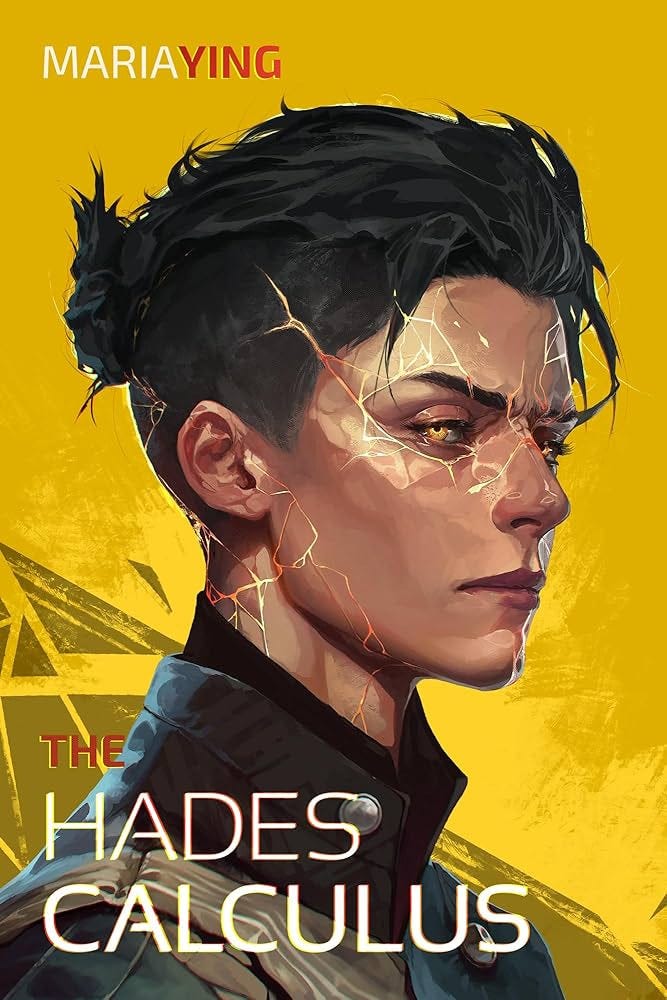



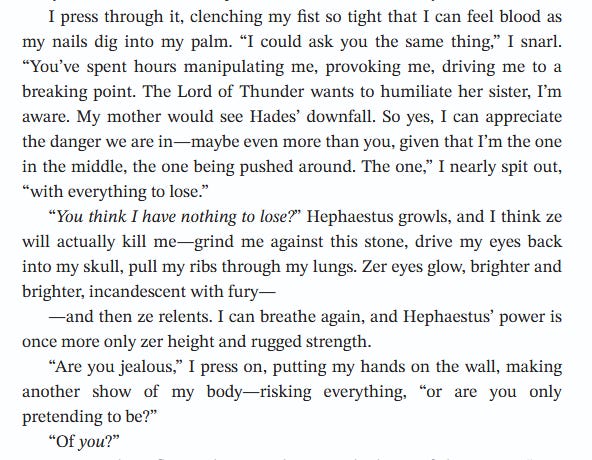




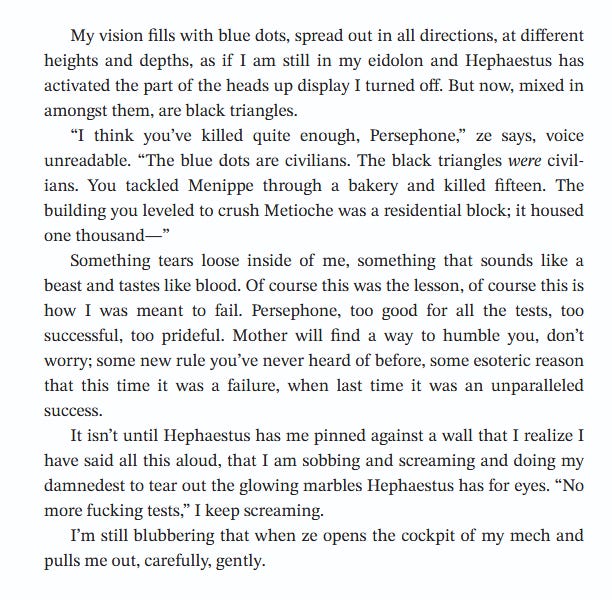
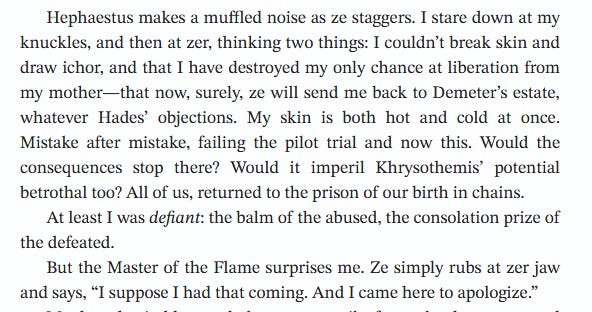

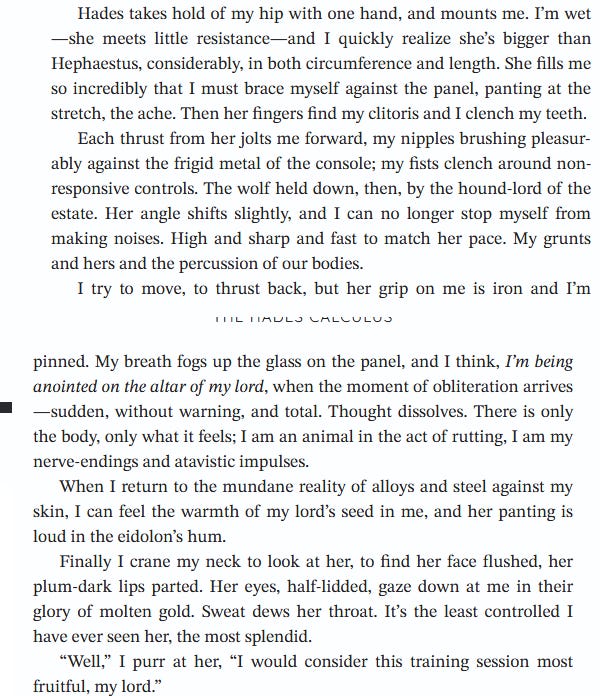
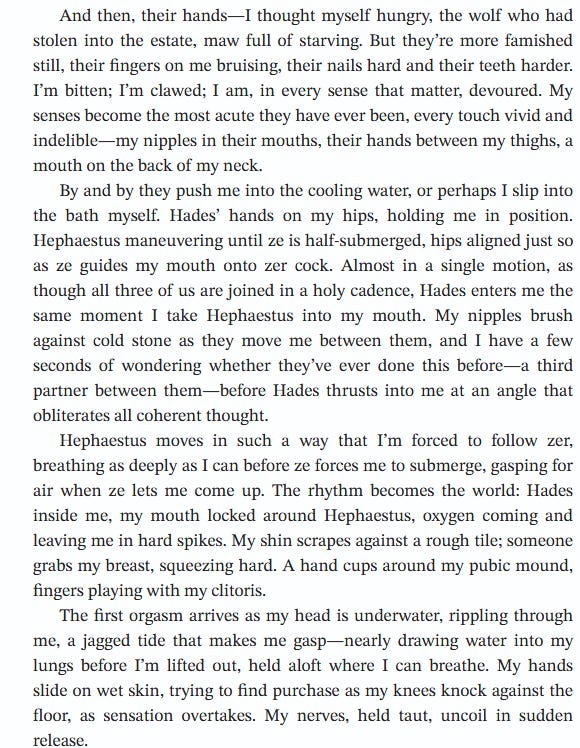
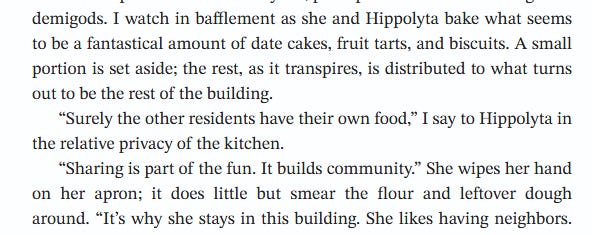


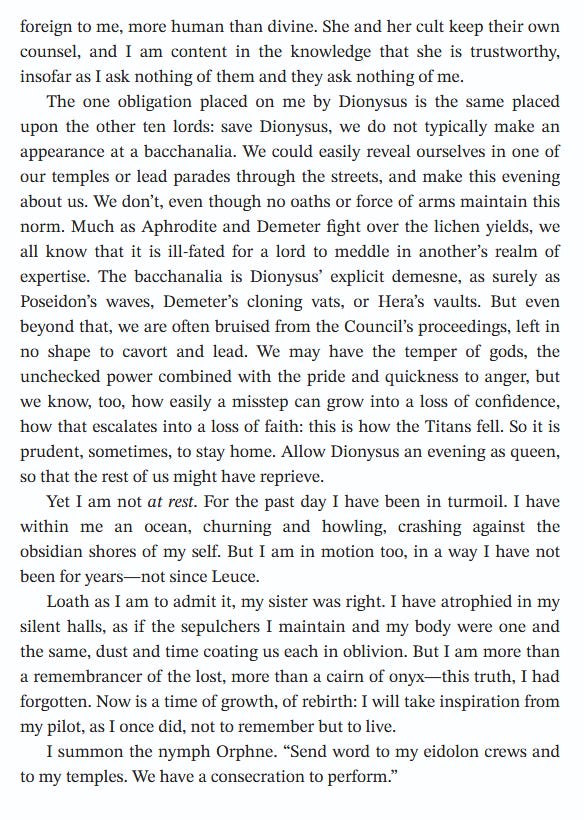


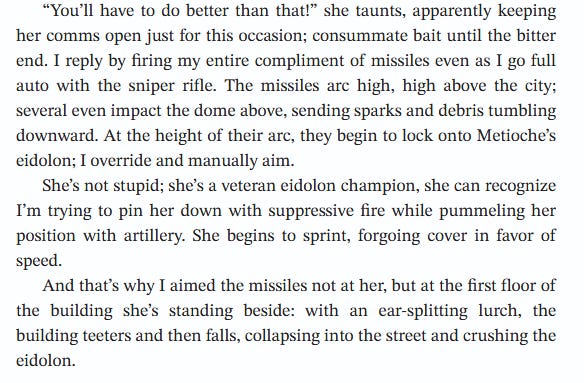






damn you really thought you were cooking here huh? embarrassing